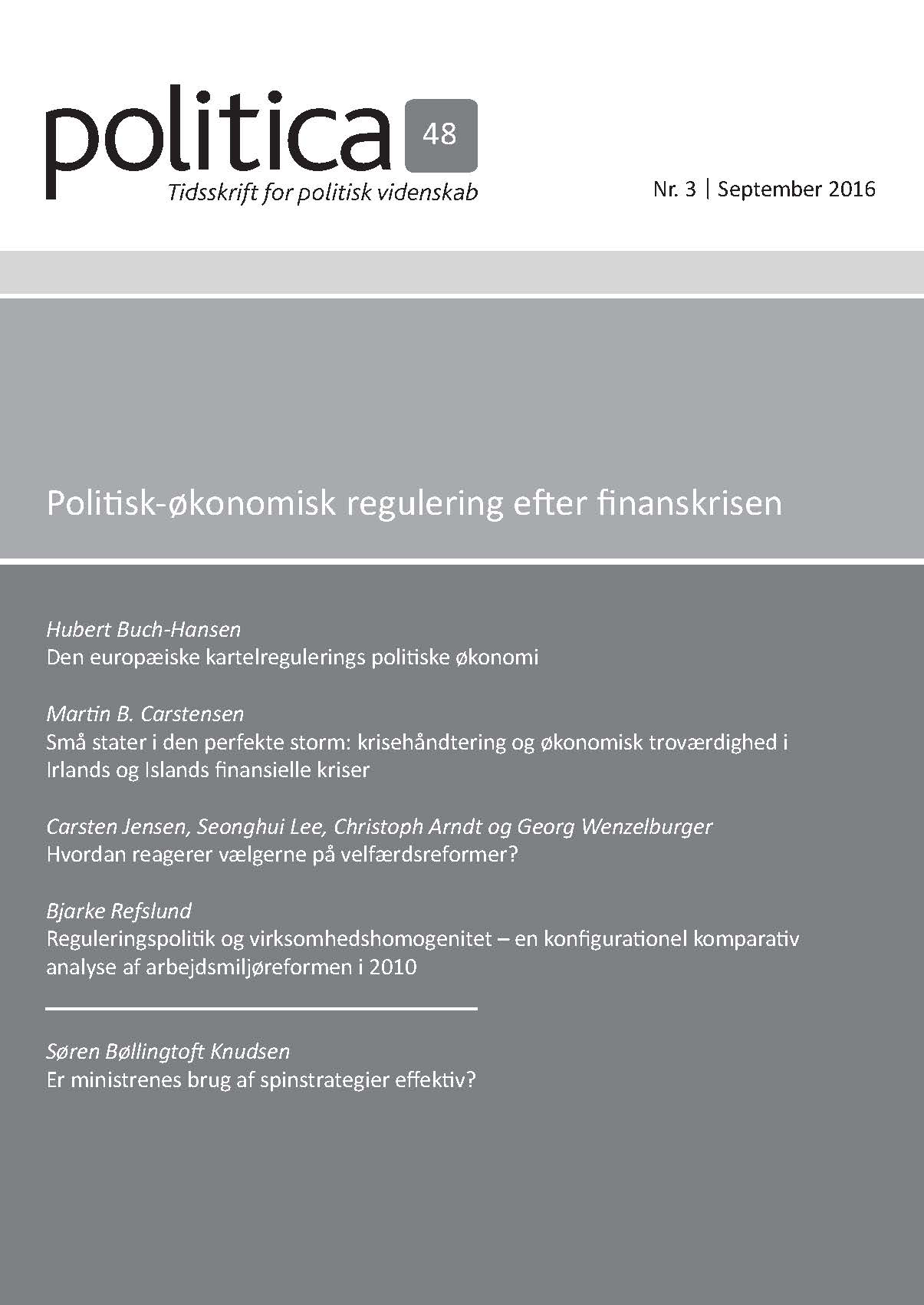Hvordan reagerer vælgerne på velfærdsreformer?
DOI:
https://doi.org/10.7146/politica.v48i3.131393Resumé
I velfærdsstatslitteraturen diskuteres det, om reformer påvirker opbakningen til den siddende regering. Vi har indsamlet årligt data på velfærdsreformer af pensions- og arbejdsløshedsområderne og meningsmålinger i Storbritannien helt tilbage til 1946. Det giver os mulighed for at teste statistisk, hvorvidt velfærdsreformer påvirker regeringens folkelige opbakning. Det viser sig, at det gør de. Nedskæringer fører til lavere støtte, men ekspansion fører til højere støtte. Ikke mindst det sidste er interessant, fordi man i litteraturen ofte fokuserer på nedskæringer. Vores analyse tyder på, at der er et næsten symmetrisk forhold, således at effekten af nedskæringer og ekspansion er nogenlunde lige stor, men altså i forskellige retninger.
Referencer
Allan, James P. og Lyle Scruggs (2004). Political partisanship and welfare state reform in advanced industrial societies. American Journal of Political Science 48 (3): 496-512.
Amable, Bruno, Donatella Gatti og Jan Schumacher (2006). Welfare-state retrenchment: the partisan effect revisited. Oxford Review of Economic Policy 22 (3): 426-444.
Armingeon, Klaus og Nathalie Giger (2008). Conditional punishment: a comparative analysis of the electoral consequences of welfare state retrenchment in OECD nations, 1980-2003. West European Politics 31 (3): 558-580.
Arndt, Christoph (2013). The Electoral Consequences of Third Way Welfare State Reforms: Social Democracy’s Transformation and its Political Costs. Amsterdam: Amsterdam University Press.
Clasen, Jochen og Daniel Clegg (2011). Regulating the Risk of Unemployment: National Adaptations to Post-industrial Labour Markets in Europe. New York og Oxford: Oxford University Press.
Duch, Raymond M. og Randolph T. Stevenson (2008). The Economic Vote: How Political and Economic Institutions Condition Election Results. Cambridge og New York: Cambridge University Press.
Elmelund-Præstekær, Christian, Michael Baggesen Klitgaard og Gijs Schumacher (2015). What wins public support? Communicating or obfuscating welfare state retrenchment. European Political Science Review 7 (3): 427-450.
Giger, Nathalie (2011). The Risk of Social Policy?: The Electoral Consequences of Welfare State Retrenchment and Social Policy Performance in OECD Countries. London og New York: Taylor & Francis.
Giger, Nathalie og Moria Nelson (2011). The electoral consequences of welfare state retrenchment: blame avoidance or credit claiming in the era of permanent austerity? European Journal of Political Research 50 (1): 1-23.
Green-Pedersen, Christoffer (2002). The Politics of Justification: Party Competition and Welfare-State Retrenchment in Denmark and the Netherlands from 1982 to 1998. Amsterdam: Amsterdam University Press.
Jensen, Carsten (2014). The Right and the Welfare State. New York og Oxford: Oxford University Press.
Jensen, Carsten og Peter B. Mortensen (2014). Government responses to fiscal austerity: the effect of institutional fragmentation and partisanship. Comparative Political Studies 47 (2): 143-170.
Korpi, Walter og Joakim Palme (2003). New politics and class politics in the context of austerity and globalization: welfare state regress in 18 countries, 1975-95. American Political Science Review 97 (3): 425-446.
Marshall, Thomas H. (1950). Citizenship and Social Class. London: Pluto Press.
OECD (2014). Social Expenditure Update. Paris: OECD Publishing.
Pierson, Paul (1994). Dismantling the Welfare State? Reagan, Thatcher and the Politics of Retrenchment. Cambridge og New York: Cambridge University Press.
Scruggs, Lyle, Detlef Jahn og Kati Kuitto (2014). Comparative Welfare Entitlements Dataset 2. Version 2014-03. University of Connecticut & University of Greifswald.
van Oorschot, Wim (2006). Making the difference in social Europe: deservingness perceptions among citizens of European welfare states. Journal of European Social Policy 16 (1): 23-42.
Downloads
Publiceret
Citation/Eksport
Nummer
Sektion
Licens
LicensOphavsretten tilhører Politica. Materialet må ikke bruges eller distribueres i kommercielt øjemed.





